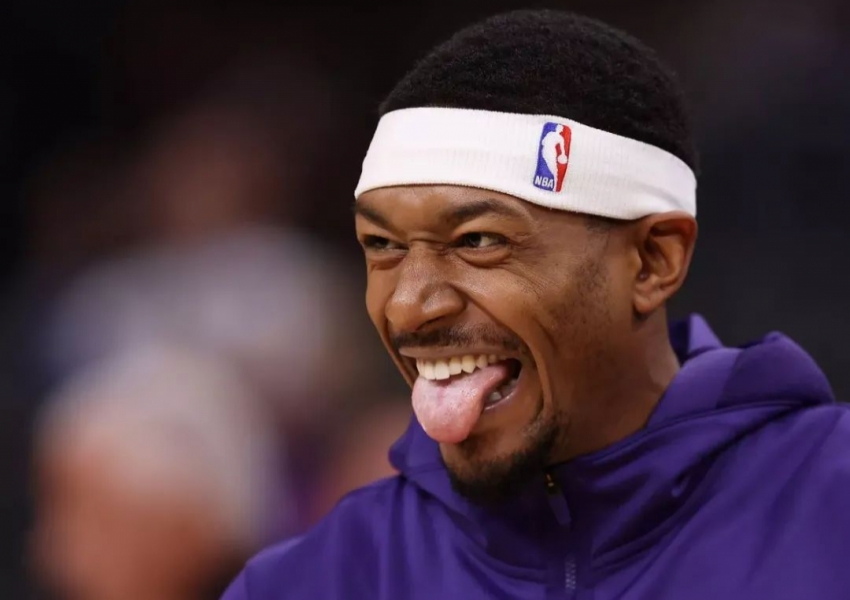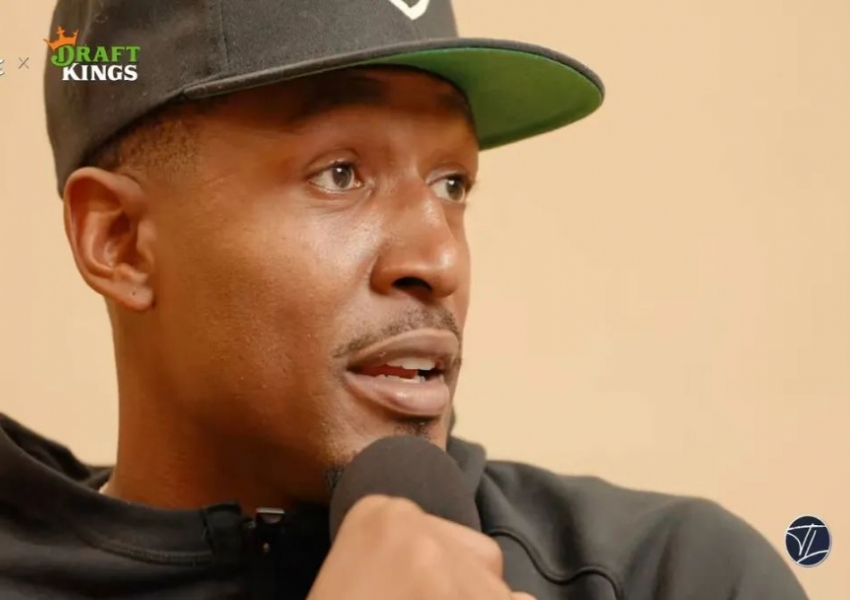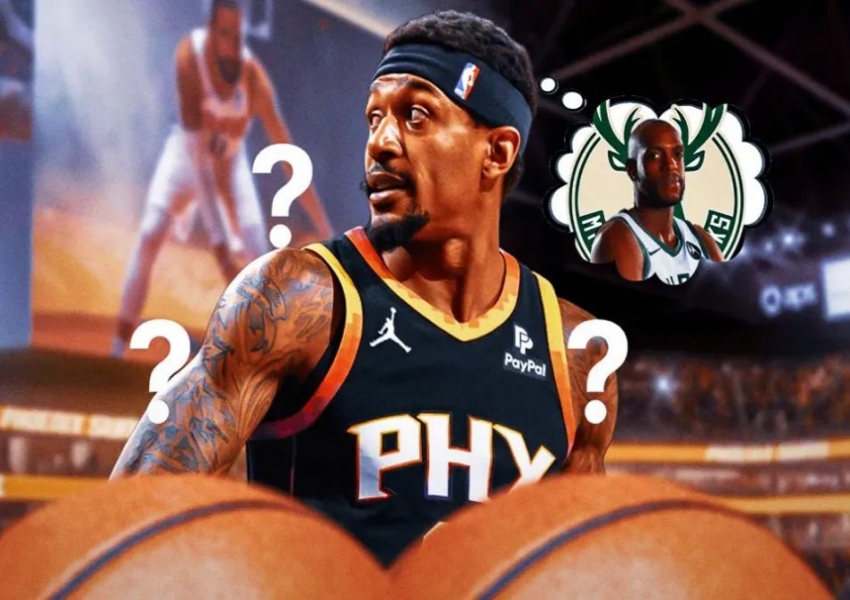A Few Words, Two Teams Offended: Does Bradley Beal Want Out of the Suns?
Bradley Beal recently made headlines after appearing on the Run Your Race podcast, where he opened up about his trade to the Phoenix Suns and revealed surprising details about the process. Beal’s candid comments, particularly about how he never initially considered Phoenix, and how he preferred to join either the Miami Heat or Milwaukee Bucks, raised eyebrows. His reflections have not only stirred conversations among fans but also potentially irked multiple teams, all while raising questions about Beal's current commitment to the Suns.

Beal’s statement—"There’s no loyalty in this league"—has struck a chord. NBA fans are well aware that the league is first and foremost a business, and even franchise players can find themselves traded when their performance declines. But it was Beal’s reference to the Bucks, and specifically to their willingness to trade Khris Middleton for him, that drew the most attention. "I hated to hear that," Beal said. "The Bucks wanted to trade Middleton for me. He was their championship hero. As a competitor, I liked the idea of playing in Milwaukee, but I didn’t want it to be at the expense of someone like Middleton."

The timing of these comments has certainly raised concerns. Middleton is still with the Bucks, and with Milwaukee aiming to contend for another championship, it’s unclear how players like Middleton or even Giannis Antetokounmpo—who has been vocal about his desire for the Bucks to remain competitive—will react to hearing that the organization once considered trading away one of their key players. As the Bucks prepare for another run at the title, Beal’s revelations may cast an unnecessary shadow over their season.

But Beal’s comments also invite scrutiny about his own situation in Phoenix. After all, the 2023-24 season didn’t go as planned for Beal and the Suns, and his words about initially not wanting to join the team could be interpreted as a sign of deeper dissatisfaction. It begs the question: Does Beal still want out of the Suns?
Beal’s Disappointing First Year in Phoenix
Beal’s first season with the Suns didn’t live up to expectations. When Phoenix acquired him in a blockbuster trade, the team was widely viewed as a top contender for the NBA championship. Beal was coming off a stellar run with the Washington Wizards, where he had been their primary offensive weapon. At his peak, Beal averaged 30.5 points per game in 2019-20 and followed that up with 31.3 points in 2020-21. If it hadn’t been for James Harden and Stephen Curry’s scoring outbursts during those same seasons, Beal might have secured two scoring titles.
However, things did not go as smoothly in Phoenix. With superstars Devin Booker and Kevin Durant already commanding much of the offensive load, Beal found himself in a new role. He was no longer the focal point of the offense, and his scoring numbers dipped as a result. In 53 games with the Suns, Beal averaged 18.2 points, 4.4 rebounds, and 5.5 assists per game. It was his lowest scoring average since 2016, a far cry from the Beal fans were used to seeing in Washington.
Though Beal’s reduced scoring was partly due to the Suns’ stacked lineup, his efficiency improved. He shot 51.3% from the field, a career-high, and connected on 43% of his three-point attempts, another personal best. His true shooting percentage of 60.7% also marked a career high. Offensively, Beal’s efficiency had never been better, but his diminished role meant that he was no longer putting up the eye-popping numbers he once did.
The real problem, though, was on the defensive end. Beal’s defense was a weak spot throughout the season. He averaged 13.8 contests per game, but instead of forcing misses, opponents actually shot better when defended by Beal. His presence raised opposing players’ shooting percentage by 0.3%, and from beyond the arc, Beal’s impact was even worse. Opponents shot 40.2% from three-point range when guarded by Beal, an increase from the average of 36.9%. His defensive struggles became a glaring issue, particularly during the playoffs.
In Phoenix’s brief and disappointing playoff run, the Suns were swept by the Minnesota Timberwolves in four games. Despite entering the series as favorites, the Suns were thoroughly outplayed, losing each game by an average margin of 15 points. Beal’s postseason struggles mirrored his regular-season issues. He averaged just 16.5 points, 2.8 rebounds, and 4.5 assists while shooting 43.5% from three-point range. While those numbers aren’t terrible for a third option on offense, his defense was a major liability.
During the four games, Beal was tasked with guarding Minnesota’s star guard Anthony Edwards for a total of 33 minutes across 156 possessions. In those minutes, Edwards torched Beal, scoring 54 points on 17-of-28 shooting, along with nine assists. Edwards didn’t just outplay Beal; he dominated him. Beal’s inability to slow Edwards down contributed heavily to Phoenix’s early exit from the playoffs, and it became clear that his defensive deficiencies were a major issue.
The Financial Burden of Beal’s Contract
Beyond the on-court issues, one of the biggest challenges the Suns face with Beal is his massive contract. He has three years left on his deal, which will pay him $50.2 million, $53.7 million, and $57.1 million in each of the next three seasons. To make matters worse, Beal’s contract includes a no-trade clause, meaning he can veto any trade he doesn’t approve of.
This financial commitment looms large over the Suns’ future. If Beal were earning around $30 million a year, his performance might be easier to swallow. But for a player making over $50 million a season, expectations are much higher. And with the team’s salary cap situation already stretched thin, Beal’s contract severely limits Phoenix’s ability to make other moves to improve the roster.
The Suns made a significant gamble when they traded for Beal. At the time, many analysts believed that Phoenix didn’t need another high-scoring player. Instead, the team’s most glaring needs were in other areas, particularly in the frontcourt and on defense. Yet, Phoenix shipped out Chris Paul, a steady veteran presence and floor general, and brought in another scorer, seemingly ignoring the team’s more pressing needs.
As Beal himself admitted, even he didn’t see the trade to Phoenix coming. The Suns, it seems, were a "flyball"—a team that swooped in unexpectedly. In hindsight, it’s fair to question whether Phoenix’s front office made the right decision. Beal’s arrival didn’t address the team’s weaknesses, and by sending away Paul, they lost an important piece of their leadership.
Looking Ahead to the New Season
Heading into the 2024-25 season, the Suns are once again considered contenders. With Durant, Booker, and Beal leading the way, Phoenix certainly has the firepower to compete for a championship. They’ve also added a true point guard in Tyus Jones, which should help improve their ball movement and balance the offense. However, the Suns’ defensive issues remain unsolved.
The Western Conference is loaded with talented teams, and if Phoenix hopes to break through and win a title, they’ll need to shore up their defense. As for Beal, this season will be critical in determining his long-term future with the team. If the Suns struggle again and fail to make a deep playoff run, it’s likely that the front office will consider breaking up their "Big Three." Beal, despite his no-trade clause, could find himself at the center of those discussions.
Beal’s admission that he never really envisioned himself with the Suns adds another layer of intrigue to the situation. Even though he’s played a full season in Phoenix, his recent comments suggest that he might not be fully committed to the team. And if the Suns once again fall short of their championship goals, the pressure will mount for changes.
When that time comes, Beal will need to decide whether he wants to be part of Phoenix’s future or if he would rather use his no-trade clause to force his way to a new destination. One thing is clear: if the Suns’ 2024-25 season doesn’t go according to plan, there will be plenty of drama surrounding Beal’s next move. And given his recent comments, it seems that he might already be thinking about his next chapter.
Copyright Statement:
Author: focusnba
Source: FocusNBA
The copyright of this article belongs to the author. Reproduction is not allowed without permission.
Recommended Blog
- Injury-Prone Again! Can Malcolm Brogdon Be the Missing Piece for a Championship in His Contract Year?
- It's Official! Zhang Zhenlin to Miss CBA Games — China's Best Forward Temporarily Sidelined
- Frustration Grows: Cui Yongxi’s Preseason Struggles, 0-4 Shooting, and a Teammate Hogging the Ball
- Explosive Start! Lakers Preseason Debut Reveals Two Surprises, Was the $32M Contract Worth It?
- Breaking News: Serious Wrist Injury! Exum's Fragile Career Takes Another Hit
- Born in 2004, Rim-Bending Power! More Explosive Than Zion? Pelicans Shaking Up the Western Conference Title Race
- 19 Minutes, 6 Three-Point Attempts! Westbrook Has Changed: Nuggets’ Championship-Level Signing
- It’s Confirmed! "Houston Harden" Mode Activated: Will James Harden Explode This Season?
- Explosive Debut! Zhao Weilin Drops 12 Points, 10 Assists: The Closest Chinese Guard to the NBA
- Brooklyn Nets Announce 20-Man Roster! Cui Yongxi Faces Tough Road as China's Only NBA Forward
Hot Blog
- FMVP Fifth?! How 33-Year-Old T.J. McConnell Became a Finals Force in the Shadows
- The SGA Stopper: Just How Good Has Andrew Nembhard Been in the NBA Finals?
- G6 Meltdown: The Pacers Scored Just 108—So How Did the Thunder Lose by 30?
- The Five-Minute Collapse: From G5 Villain to G6 Redeemer—Can Nembhard Bounce Back?
- Not Even Durant Can Get Him: Why 28-Year-Old Ivica Zubac Is Now Untouchable in LA
- The Ultimate Underdog: How T.J. McConnell Became the Unsung Hero of This Year’s NBA Finals